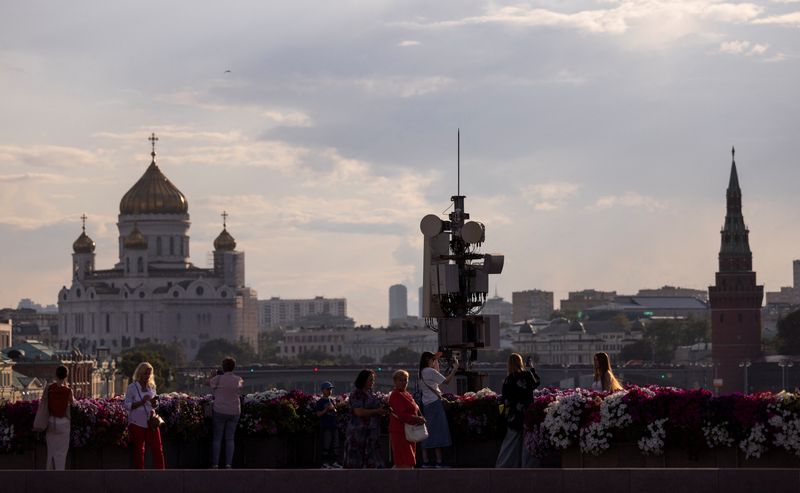By Darya Korsunskaya
MOSCOW (Reuters) - Russia will need to raise taxes further to fund its war in Ukraine, according to economists who say revenue-raising measures already announced will not be enough to fund the country's ballooning military spending.
Russia's draft 2025 budget allocates about one-third of total expenditure, or 6.3% of GDP, to the military - the highest level since the Cold War. For the first time, the share of spending on defence will be double that of social spending.
The huge increase in military spending is generating inflationary heat in Russia's economy. Interest rates have risen to their highest since 2003 and the rouble has slid to a one-year low against the dollar. With Western sanctions effectively barring Moscow from the international bond markets its fundraising options are limited.
The government has already started raising taxes to fund its war in Ukraine, now in its third year. A major tax reform is expected to generate additional revenues worth 1.7% of GDP in 2025. Economists argue this will not be enough.
"The adjustment of domestic taxes will remain a constant focus for the authorities. It is possible that in 2025 we will see many initiatives to amend tax legislation and regulations," said Alexei Klimyuk from Alfa Wealth.
An expected fall in the price of oil, Russia's main export commodity, is also casting a shadow over the country's finances. The draft budget projects the price of oil will decrease on average from $70 per barrel in 2024 to $65.5 per barrel in 2027, denting state revenues.
"This structure keeps the budget heavily dependent on oil prices. This means that, if not in 2025 then in the coming years, the question of where to find additional revenue will arise again," said Natalia Orlova, chief economist at Alfa-Bank.
LITTLE HEADROOM
Finance Minister Anton Siluanov said last year there was no room to increase spending and warned that if it were not contained the burden would fall on Russian citizens and businesses through inflation or higher taxes.
Both have occurred. Inflation is running at more than double the central bank's target, with the key interest rate at 21%, the highest level since the early years of President Vladimir Putin's rule.
The Russian economy has held up surprisingly well since the start of the war, despite Western sanctions, with little sign of public discontent amid historically low unemployment and record high wage growth.
Starting in 2025, increases in corporate and personal income taxes, along with a new car recycling tax and a series of smaller tax initiatives, are expected to generate 14.7 trillion roubles over three years.
"It is the budget of higher taxes, debt servicing costs, and geopolitical expenditure," said Evgeny Nadorshin, an economist at PF Capital.
Nadorshin pointed to a higher "exit tax" for foreign companies leaving Russia and a plan to raise a contribution from Russian buyers of their assets as examples of new tax initiatives from the government.
"The budget has never been so fiscally focused on extracting revenues from every possible source as it has been recently," Nadorshin said.
SPENDING CUTS ELSEWHERE
Other measures to be introduced in 2025 include a 11.6% cut in support for small businesses and an 11% reduction in funding for an education development programme, according to a Reuters analysis of the draft budget.
Subsidies to regional budgets for social benefits, including funds to top up state pensions, will be cut by 31%, while financing for a social services modernisation programme will decrease by 35%.
"The 2025 budget suggests that Putin is forced to cut spending in almost all areas to finance the war," says economist Sergei Aleksashenko, a former deputy governor of the central bank.
Deputy Finance Minister Vladimir Kolychev noted that while military spending has grown by 3.0-3.5% of GDP during the war years, overall spending has grown only by 2%.
“This indicates prioritisation, meaning the remaining spending has essentially been reduced by 1-1.5% of GDP, such is the fiscal consolidation now,” Kolychev said, in a rare public admission of the shift in government priorities.
Even President Vladimir Putin's "national projects" - development plans for strategically important areas - are at risk, with some funding shifted to 2028-30, according to economist Andrei Klepach, a former deputy minister of economy.

"In 2026-27 we will need to find opportunities through undistributed funds and reserves to ensure consistency and stability. Otherwise, the target parameters will be at risk," he said.
($1 = 97.1500 roubles)